I have a set of data in a MySQL database. I'm retrieving a list of a results ordered by a field called login. When I retrieve this set, two of the lines are in the following order.
cco1@blah.com
cco10.test@blah.com
However, when I compare them in Java (necessary because of the post-processing needed to merge objects application side), cco10.test@blah.com has a value less than cco1@blah.com. In other words, the String comparison would expect them to be in the following order.
cco10.test@blah.com
cco1@blah.com
As a whole, everything else is returned in the correct order. I assume the difference here is most likely a difference in the way Java and MySQL string comparison treats certain values. How do I get these to return in a consistent order (I'm ok with them being either way, just need the consistency).
Query I'm running:
select t0.id as envUserId , t0.environment_id as envId, t0.environment_name as envName, t0.customer_name as customerName, t0.version version, t0.user_id as userId, t0.login as userLogin, t0.sso_granted_roles as sso_granted_roles, t1z_.role_name as defaultRole, t3.id as customRoleId, t3.name as customRoleName
from environment_user t0
left join (
select distinct eu.id, eu.login
from environment_user eu
left join environment_user_role eur on eu.id = eur.environment_user_id
left join environment_user_custom_role eucr on eu.id = eucr.environment_user_id
left join custom_role cr on eucr.custom_role_id = cr.id
where eu.environment_id = '5a83069a-70d2-4d0e-9847-c709725281c5'
and (eur.role_name in ('Role1','Role2')
or cr.name in ('Role1','Role2'))
order by eu.login limit 0, 200) f on t0.id = f.id
left outer join environment_user_role t1z_ on t1z_.environment_user_id = t0.id
left outer join environment_user_custom_role ct1z_ on ct1z_.environment_user_id = t0.id
left outer join custom_role t3 on t3.id = ct1z_.custom_role_id
where t0.environment_id = '5a83069a-70d2-4d0e-9847-c709725281c5'
and t0.id = f.id
order by userLogin asc
What I'm getting back (extra lines above and below have been removed for clarity)
'c2ad9f82-e0d5-4f8d-a5fe-a2d72d901b98', '5a83069a-70d2-4d0e-9847-c709725281c5', 'SearchTestDomainEnv', 'SearchTestDomainCustomer', '1', '649ea0bc-dab7-4ad2-a534-546f9817e252', 'c9ca3e83-ccc6-4108-aee4-1bc41e6294ff@searchtestdomain.com', '0', 'Role1', NULL, NULL
'83313002-49a3-45f2-9013-e8dab15789d5', '5a83069a-70d2-4d0e-9847-c709725281c5', 'SearchTestDomainEnv', 'SearchTestDomainCustomer', '1', '40d5c22a-33f8-4a37-a4db-63e3709cfae7', 'ccc@searchtestdomain.com', '0', 'Role1', NULL, NULL
'5ba69c88-a773-4d5b-835d-c88688867d6a', '5a83069a-70d2-4d0e-9847-c709725281c5', 'SearchTestDomainEnv', 'SearchTestDomainCustomer', '1', '91a7609a-4809-4e27-9d6f-448ff62b38b3', 'cccc@searchtestdomain.com', '0', 'Role1', NULL, NULL
'6833a699-b5ca-46aa-8a53-23a6ef41e1f8', '5a83069a-70d2-4d0e-9847-c709725281c5', 'SearchTestDomainEnv', 'SearchTestDomainCustomer', '1', '718808fa-3799-457f-9cdb-88ef887e0492', 'cco1@searchtestdomain.com', '0', 'Role1', NULL, NULL
'c466c478-8a32-4926-9cde-06a40071ac85', '5a83069a-70d2-4d0e-9847-c709725281c5', 'SearchTestDomainEnv', 'SearchTestDomainCustomer', '1', '6282739d-76ea-4dbb-be5e-b7d64d3b3f3f', 'cco10.test@searchtestdomain.com', '0', 'Role1', NULL, NULL
'5b04d561-6c20-4703-aa96-f17eda0405b6', '5a83069a-70d2-4d0e-9847-c709725281c5', 'SearchTestDomainEnv', 'SearchTestDomainCustomer', '1', 'fb644427-46ab-42e4-8295-65a397409c0d', 'cd67848c-62fc-4cb3-ab7d-8b2d49709973@searchtestdomain.com', '0', 'Role1', NULL, NULL
'27116bed-a1a6-483c-9e7b-97158786245c', '5a83069a-70d2-4d0e-9847-c709725281c5', 'SearchTestDomainEnv', 'SearchTestDomainCustomer', '1', '246f392d-6d27-402e-837f-98384da0abb6', 'd1072b14-2956-432e-9243-72b68275fbe6@searchtestdomain.com', '0', 'Role1', NULL, NULL


